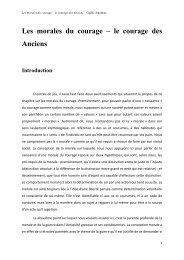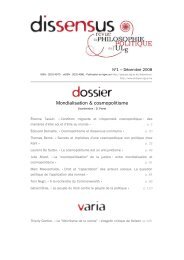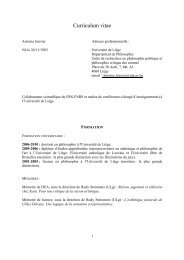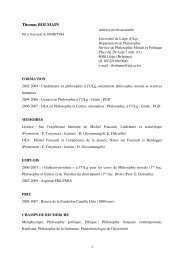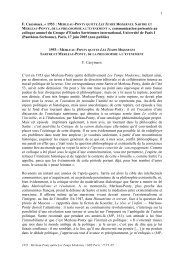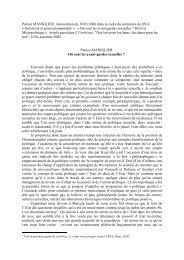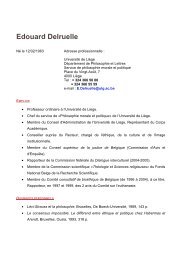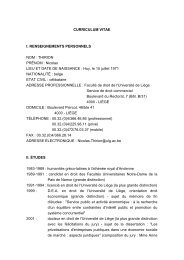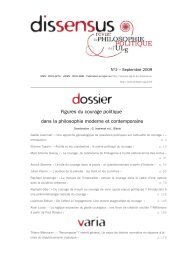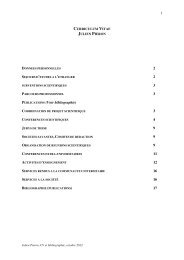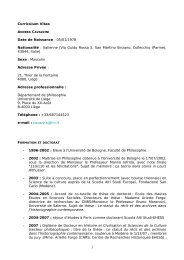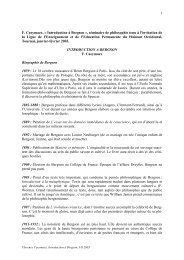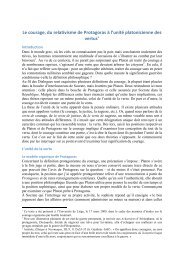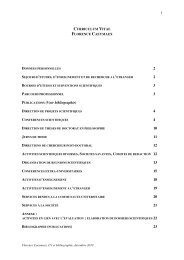Subjectivations politiques et économie des savoirs - Service de ...
Subjectivations politiques et économie des savoirs - Service de ...
Subjectivations politiques et économie des savoirs - Service de ...
You also want an ePaper? Increase the reach of your titles
YUMPU automatically turns print PDFs into web optimized ePapers that Google loves.
– François Charbonneau : « Comment lire Essai sur la révolution d’Hannah Arendt* ? » –<br />
p. 149<br />
À sa suite, Seyla Benhabib a insisté sur l’importance du récit comme réponse<br />
méthodologique à la nouveauté du phénomène totalitaire dans l’œuvre <strong>de</strong> H. Arendt. 21<br />
La démonstration 22 <strong>de</strong> S. Benhabib est à la fois pénétrante <strong>et</strong> convaincante, du moins<br />
pour ce qui est <strong><strong>de</strong>s</strong> Origines du totalitarisme. En eff<strong>et</strong>, elle m<strong>et</strong> en évi<strong>de</strong>nce que<br />
l’écriture <strong>de</strong> l’histoire du totalitarisme posait à H. Arendt un problème particulier : « my<br />
first problem was how to write about som<strong>et</strong>hing – totalitarianism – which I did not want<br />
to conserve but on the contrary felt engaged to <strong><strong>de</strong>s</strong>troy 23 . » Comme le note S.<br />
Benhabib, H. Arendt est confrontée à la nouveauté absolue <strong>de</strong> son suj<strong>et</strong>, ce qui pose<br />
un problème fondamental pour la théorie politique. En eff<strong>et</strong>, comment étudier le<br />
totalitarisme en tant que phénomène politique, si l’on veut montrer, comme elle le<br />
souhaite, que la nouveauté du phénomène totalitaire est précisément <strong>de</strong> marquer la<br />
fin du politique ? H. Arendt ne pouvait pas se limiter à la simple <strong><strong>de</strong>s</strong>cription<br />
chronologique <strong><strong>de</strong>s</strong> évènements, ou à la recherche <strong>de</strong> causes directes, nécessairement<br />
inexistantes :<br />
un<strong>de</strong>r these conditions, one required a story that would once again reorient the<br />
mind in its aimless wan<strong>de</strong>rings. For only such a reorientation could reclaim the<br />
past so as to build the future. The theorist of totalitarianism as the narrator of<br />
the story was engaged in a moral and political task 24 .<br />
Dans la perspective arendtienne, le récit serait nécessaire pour s’extraire <strong>de</strong> c<strong>et</strong>te<br />
aporie. Mais, comme le reconnaît S. Benhabib sans préciser davantage, Eichmann à<br />
Jérusalem <strong>et</strong> Essai sur la Révolution sont construits <strong>de</strong> la même manière. 25 La vérité<br />
<strong>de</strong> c<strong>et</strong>te assertion, incontestable par ailleurs, ne rem<strong>et</strong>-elle pas en cause l’hypothèse<br />
même <strong>de</strong> S. Benhabib ? En eff<strong>et</strong>, pourquoi Essai sur la Révolution a-t-il besoin <strong>de</strong> se<br />
déployer comme un récit, si son suj<strong>et</strong> est justement, <strong>et</strong> exclusivement, la constitution<br />
<strong>de</strong> l’espace politique ? En d’autres termes, le problème méthodologique auquel est<br />
confrontée H. Arendt dans le cas <strong><strong>de</strong>s</strong> Origines (un livre qui traite <strong>de</strong> la <strong><strong>de</strong>s</strong>truction du<br />
politique) se pose-t-il également dans le cas d’Essai sur la Révolution (un livre qui traite<br />
<strong>de</strong> la naissance du politique) ? L’explication du recours arendtien au récit comme<br />
réponse à un problème d’ordre méthodologique ne nous semble pas satisfaisante dans<br />
le cas d’Essai sur la Révolution.<br />
21<br />
22<br />
23<br />
24<br />
25<br />
S. Benhabib, « Hannah Arendt and the Re<strong>de</strong>mptive Power of the Narrative », p. 167-196.<br />
C<strong>et</strong>te démonstration se base presque exclusivement sur un tout p<strong>et</strong>it texte que H. Arendt a écrit en<br />
réponse à la critique <strong><strong>de</strong>s</strong> Origines par E. Voegelin. Voir E. Voegelin, « The Origins of totalitarianism »,<br />
Review of Politics, vol. 15, n° 1, 1953, p. 76-85 ; H. Arendt, « A Reply », Review of Politics, vol. 15, n°<br />
1, 1953, p. 76-85.<br />
Ibid., p. 77.<br />
S. Benhabib, « Hannah Arendt and the Re<strong>de</strong>mptive Power of the Narrative », p. 180 (nous soulignons).<br />
Ibid., p. 182.



